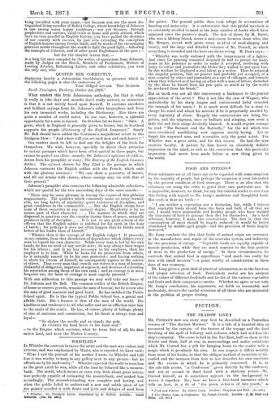WHISTLER.* Ti Whistler the contrast between the artist and the
man was violent and extreme, and was emphasized by Watts, who is reported to have said : " Wlen I saw the portrait of his mother I wrote to Whistler and told him it was worthy to hang in any gallery next to any picture—but he offends me by his mad vanity." Whistler expected the world to treat him as the great artist he was, while all the time he behaved like a mounte- bank. The world, which knows or cares very little about great artists, was perfectly capable of estimating the mountebank, and ranked him accordingly. Tho misunderstanding was complete and lasting, and when the public failed to understand a new and subtle piece of art the painter assailed it with flouts and jeers and deluges of mud from
• Whistler. By Theodore Buret. Translated by F. Rutter. London: Grant
@Mardi. LEX 6d. ils6.1 - the gutter. The general public then took refuge in accusations of humbug and insincerity. It is unfortunate that this pitiful spectacle is so constantly recalled to mind in the large number of books which have appeared since the painter's death. The last of these, by M. Duret, who was a lifelong friend, steers a mid-course between those who, like Mr. Menpes, record with gusto every incident of mud-slinging and vanity, and the largo and detailed volumes of Mr. Pennell, in which everything is recorded and the hero can do no wrong. M. Duret says :-
" Whistler was really endowed with the temperament of a fighter. And since his painting remained despised he had to persist for many years in his polemics in order to make it accepted, rendering with usury to critics and journalists the blows they wished to put upon him. In this warfare he displayed a real talent as a writer. Thus he attaincd the singular position, that no painter had probably yet occupied, of a man counted by critics and journalists as a sort of colleague, and towards whom they behaved as if having an affair with a man of letters, disturbed by the ideas he loosed from his pen quite as much as by the works he produced from his brush."
But in truth was not all this controversy a hindrance to the general appreciation of the artist ? Was it not like the case of Wagner, who undoubtedly by his sharp tongue and controversial habit retarded the triumph of his music ? It is much more difficult for a man to change his mind and admit his mistake if he is perpetually assailed by every ingenuity of abuse. Happily the controversies are being for- gotten, and the epigrams, once so brilliant and stinging, now seem a little flat and their stings decidedly blunted. It would require courage to read " The Baronet and the Butterfly," for the wit which was once considered annihilating now appears merely boring. Let us forget the wayward man, and remember only the great artist. For Whistler was a great artist, and for this reason. He had the true creative faculty. A picture by him leaves an absolutely definite impression on the mind, as well as the conviction that this particular impression had never been made before—a new thing given to the world.


























 Previous page
Previous page